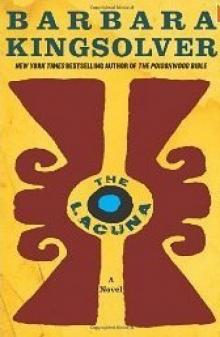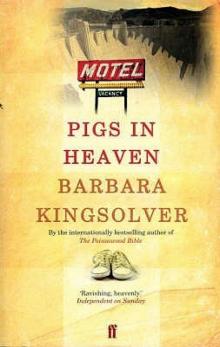- Home
- Barbara Kingsolver
Unsheltered Page 11
Unsheltered Read online
Page 11
In a display of her infinite patience, the receptionist shook her head very slowly. “This policy you have here is an HMO. Even if it does apply to your father, which I don’t think it does, you’re not authorized to see a doctor outside your own network.”
“My father-in-law needs a specialist. He probably needs several of them but right now his blood sugar is out of control and that’s what we’re here for. I called every endocrinologist in our network, and then I called anybody else that might work with an advanced diabetic, and nobody could take him. That’s why we’ve ended up here in the University Health Complex, with the only coverage available to us through the university, and ironically you don’t take it.”
“We couldn’t see him anyway without authorization from the manager of your health maintenance network.”
“And who would that be?”
“The phone number is on the back of your card.”
“I’ve called that number, believe you me. I was advised that if nobody in the network could treat my father-in-law I would have to go out of network. That’s why we’re here. To see a doctor. Which we would like to do.”
“Okay, so are you saying you will accept the charges for seeing Dr. Saberwal today out of pocket, and you don’t want us to bill your insurance company?”
Willa revised her previous observation about service workers and the served. This particular operative was going to the mat to protect the nice insurance companies from any pesky entanglement with Willa’s sick person. “Obviously I want you to bill my insurance company,” Willa said. “That’s why I pay every month for health insurance we can’t afford. That’s who advised me to go out of network. Can you please tell me what more I need to do to make this happen?”
Abruptly she slid the glass door shut, clicked her marvelous nails on her computer keyboard, then leaned over and had a brief conversation with Eartha. They both peered at the screen, which seemed to confirm all their worst suspicions. Nails slid open the glass.
“In order to be covered for an out-of-network we need to have written confirmation from all the specialists in your network that the patient can’t be treated in-network. If you want, your primary care physician might be able to coordinate the paperwork.”
Willa stared. “Those doctors don’t even have time to see their paying customers. You think they’re going to spend their lunch hour writing letters of recommendation?”
Nails stared back. “You’ll have to ax your primary care physician about that.”
Willa wanted to ax someone, not a physician. She glanced over at Nick. There would be no whining to him about this—he would just say he’d told her so. Nick really didn’t want to be there. He appeared now to have fallen asleep in his wheelchair. He also seemed blue-gray in color, although that might just have been the fluorescent lighting and zealous air-conditioning. The waiting room was freezing, and every waiting patient bore the same gray pall. Several different oxygen machines gave off small, syncopated hisses. Willa’s imagination made the very short leap from there to being trapped in a morgue.
She turned back to the receptionist. “I know this probably changes nothing, but can I just tell you my father-in-law is oozing blood and fluid from most of his lower body? His pain has to be off the charts. I’ve been trying for two months to find a doctor who’ll see him, we waited three weeks for this appointment, and today it took more hassle than you want to hear about to get him here. And the best you can do is send him home to fill up his shoes with blood? I think what you’re saying is, the man needs to die.”
The receptionist held Willa’s gaze without any visible emotion. She probably heard pathetic pleas like this five times a day. “If you’d like to see Dr. Saberwal today, I can give you the payment forms.”
“In which I give you my credit card information and a lien on my house and promise to pay all charges out of pocket. Thanks but no thanks.” Actually, she thought, Dr. Saberwal could have the house. She took her cards and started to walk away.
“Ma’am?”
She turned around to see Eartha leaning out the opened glass cubicle, beckoning her back. Was this going to be a good cop, bad cop routine? Willa returned to the window. The receptionist spoke quietly.
“We’ve had a lot of problems with that HMO. Are you and your husband both university employees?”
“No, just my husband.”
“It’s not really my place to advise you, but what a lot of people are doing is taking out a separate policy for the nonemployee members of the family.”
“A separate policy?”
“Yes. If you don’t have your own coverage through an employer you can qualify for coverage and even get his Medigap through the ACA. You’ll probably find it saves you money over the other family plan, and you’ll get better coverage.”
Willa tilted her head toward Nick. “I appreciate your advice, but my father-in-law would do surgery on himself before he’d sign up for Obamacare. I’m not even kidding.”
The receptionist smiled. “We see a lot of that. You wouldn’t have to tell him.”
The window slid shut and Willa crossed the waiting room to rouse Nick from the gray caul of his slumber. He wasn’t going to see the doctor after all. What an adventure: from his position, victorious.
*
Rather than take the day as a total loss, Willa texted Iano to ask if he could meet them for lunch. He texted back immediately: he was tied to office hours but they should come over and visit. Willa hadn’t seen his office, or set foot on campus, before this day.
“Trouble will be parking.” Iano added a sad face emoticon.
She shot back, “No worries! We have Magic Pass!” Double smiley faces.
Nick’s handicapped parking placard was the only perk of the Nick arrangement, and Willa took it as her righteous due. Directed by Siri’s know-it-all voice, she backed out of their ideal parking spot at the medical complex and headed across campus to a matching one she was sure she would find directly in front of Iano’s building. Willa’s dark mood reversed at the prospect of poaching on Iano’s office hours. Was it ridiculous to be excited about seeing your husband in the middle of the day, after the passage of marital decades? Most of her girlfriends over the years had thought so, and were always a little too glad to advise Willa of her husband’s weak points.
These friends didn’t get it. Flaws included, the marriage was a miracle. Willa had conjured Iano, long before she met him, starting around the year she copied out the lyrics of “Tea for the Tillerman” and “Into White” in her poetry journal and argued with her eighth-grade English teacher that Cat Stevens was a modern-day Lord Byron. She taped a horizontal cordon of album covers across her bedroom wall, portrait-side out, and spent a preponderance of her adolescence gazing at the soulful black eyes and sensitive mouth framed by that close-trimmed beard and curly mane. She composed letters to Mr. Stevens at the restrained rate of one per month, sent care of A&M Records. It didn’t matter at all that he never wrote back.
What mattered was that in her freshman year in college, well after she’d stopped writing fan letters, Iano Tavoularis materialized in the doorway of her dorm room (by mistake; he was looking for a girl named Kendra, same room, different floor) and didn’t leave for the rest of the weekend. At the moment of apotheosis, “Moonshadow” was playing on her stereo. To Willa he was physically indistinguishable from the pop star she loved, though a decade younger, which didn’t hurt, and he knew all the lyrics to “Tea for the Tillerman,” plus “Wild World” and “Hard Headed Woman.” She couldn’t believe her luck. He was not technically a musician, and Willa didn’t care. He was funny and gorgeous and spoke Greek and found Willa amazing, both intellectually and in bed. She might have been the lone female fan who didn’t wring her hands when the actual Mr. Stevens converted to Islam and quit singing, or even when he made some ill-chosen remarks about the fatwa against Salman Rushdie. Her affections by then had been fully transferred. Willa didn’t need a singer, it turned out. The singer was the warm-u
p act.
Now she rejoiced, approaching Iano’s building, to find the predicted bank of empty wheelchair-designated parking spots less than fifty feet from the door. Even that short distance was more than Nick cared to cross to go visit his son, it turned out. He was fed up with the whole wheelchair-and-oxygen-machine switcheroo. This was fine with Willa, who agreed to leave him in the car, ignition running, air-con blasting, and windows rolled down partway for safety’s sake. Ecstatic to be free of her charge, she set aside the morality of using that parking spot when the designee wasn’t technically going anywhere.
She cut across a small lawn where dozens of halter-topped girls and shirtless young men had parked themselves on the grass. They seemed too disorganized to be a class, but too numerous to be random sun lovers out catching the year’s last rays. She would ask Iano if it was some kind of sit-in. He would know. College activists swirled around Iano like bees, eagerly mistaking his kindness for approval: the Campus Greens, the divestment committees, even the antiestablishment hard core could get Dr. Tavoularis to sign on as faculty adviser. Willa couldn’t imagine this had helped his career of tenure battles, even though his credentials as a radical were in fact lousy. Arriving too late in college to protest Vietnam or burn down any ROTC buildings, and much too early to occupy anything like Wall Street, they were that generation. In his Intro to Political Philosophy classes Iano always spent too many lectures on Aristotle and ended up slighting Karl Marx. But he had a certain twinkle that encouraged renegades and unsettled administrators.
And was catnip to coeds, Willa was now reminded, finding six of them lined up outside his closed door. They sat on the floor with long, tanned legs extended straight in front of them like Rockettes in cutoffs and Toms. Willa felt a twinge of intimidation but laid a benevolent smile across the lot of them anyway, and tapped on the closed door.
“He’s in conference,” one of them hissed, just as Iano called “Moraki mou? Ela!”
She opened the door and Iano waved her in with a big, happy gesture. Willa answered to some frankly awful pet names: moraki was a diminutive of moro, literally meaning “infant,” same root as moron. And not one of those Rockettes needed to know. Greek was the clandestine language of Willa’s marriage. In very public places Iano could and did torture her by proposing vivid sexual acts.
“Gino, this is Willa, my wife. Gino is doing an undergraduate thesis on modern instruments of foreign policy. Where’s Pop?”
“Tuckered out. He didn’t feel like getting out of the car. We’ve had quite a day. Should I wait outside till you two finish tuning your instruments?”
Gino laughed. He seemed lovely. “We’re done, I was just taking off actually. Gotta rock the revolution out there at three.” Gino flipped his long hair sideways, picked up his backpack, shook hands with Iano in an adult manner, and scooted out. Once the door had closed, Iano fell backward with some drama into his chair.
She lifted an eyebrow. “You’ve still got the cheerleader squad out there, Dr. T.”
He gave Willa a helpless, pleading look. “Save me? Maybe Pop is having a heart attack or something and I have to dash away?”
“Would that he were.”
Willa absorbed Iano’s smile in all its facets: mischievous, grateful, weary, content. So much of their contract passed without words in five-second pauses like this.
“Sorry I can’t steal you off to lunch. I should have brought you a sandwich.”
“Already had one. Did you and Pop eat?”
“Didn’t have time. So I have to ask. What revolution are we rocking at three?”
“A campaign speech. Well, it’s not really a speech, it’s a live feed in the parking lot. A van comes in with a big screen and they watch a talk that’s happening somewhere else. A socialist running for president, who’d have guessed? These kids are going nuts. Kick the billionaires’ asses, raise minimum wage, make college free. That revolution.”
“Yikes, I’m in that parking lot. Will I be able to get out?”
Iano checked his watch. “You’ve still got half an hour.”
So that was it, with the gathering tribes. Free college, clothing optional.
Iano sat up, suddenly reanimated. “Hey, did Zeke call you with his good news?”
“I haven’t checked my phone. It’s been …” She exhaled. “You won’t believe this. Nick didn’t get in to see a doctor. They wouldn’t take our insurance.”
“That’s impossible.”
“Possible.”
“I swear I filed the paperwork. The very first week.”
She had let him handle the insurance because he wanted badly to shoulder some of the burden of Nick, even though Iano was terrible at such things. Iano tried to look after his father’s health and ended up buying him cigarettes. He’d probably assumed the HMO would cover Nick because they really needed that to happen. Willa sank into a chair so she and her husband would be on the same plane.
“Sweetheart, it’s not your fault. I know you signed up. You did everything you were supposed to do, and it should have been enough. And still we totally and completely struck out. I’m not sure we have any options for Nick.”
She watched him registering this: his father dying in their house without the kindness of medical backup. He cursed quietly.
“What is this, Iano? It’s like the rules don’t apply anymore. Or we learned one set, and then somebody switched them out. Oh, get this, the receptionist advised me to put him on Obamacare.”
Iano’s shoulders shook in a long, silent laugh. “It would be efficient, from an actuarial perspective. The day we signed him on, that would finish him off.”
“Tempting.”
Iano made a noble but unconvincing effort to smile. He was absorbing the genuine horror of this next phase in their sequence of family disasters. It took a lot to pull Iano off the happy train. His unexpected sobriety made Willa feel less alone, but also maybe terrified. What if Iano’s joy was the tentpole of her sanity?
“So what’s Zeke’s good news?” she asked.
Iano lit up. “His investment start-up. They’re getting their hands on something like ten million dollars.”
“Christ. How on earth?”
“One of their Harvard connections. I’m sure we’ll hear all about it tonight. Something to do with the fund he helped manage when he was a grad student. Now the college is farming out some of their accounts to private investment managers and one of his old advisers put it together. There’s still some question about FINRA and internal approvals, I don’t know the details, but Zeke is positive it’s going to work. Good Money is off and running.”
“Wow. Just like that.”
“I guess that’s why people go into debt at Ivy League schools. For the connections.”
Willa found herself getting angry. “But really? Does this not strike you as crazy, that a kid who literally can’t afford to rent a home for himself and his child is going to be managing somebody’s ten million dollars?”
“He’ll get commissions.”
“Let us pray.”
Willa knew he would. Zeke was more practical than his father about taking care of business. But unlike Iano, she just couldn’t see this jackpot as some normal next step. Different as they were in temperament, father and son shared an unrealistic faith in good financial fortune. They expected it. In Iano’s first-generation immigrant family, they might as well have had a cross-stitched sampler on the wall saying “God Bless Our Capitalist Home.” Something in his bones promised Iano he was going to get into the club, and he’d passed that on. Willa’s bones told her with equal conviction that the roof over their heads would not outlast the winter.
“Did the hedge fund baron mention whether he’ll be home this afternoon? There’s no way I can get Nick back into the house by myself.”
“He’s there now. He said Tig and her friend took the baby for a picnic in the graveyard or some damn thing, but he’s purposely staying on hand so you’ll have a landing crew when you get there.”
/> “That was thoughtful of him.”
“That’s your son.”
Willa was relieved to hear it, but still didn’t want to go back to the car and drive home. Why do that, when she could sit here looking at her husband backlit from a window like some Raphaelite angel? Going gray at the temples, and wearing a button-down shirt, but still. In the looks department she would always believe she had married up, despite three decades of his testimonials. The Greek tongue has an excess of words for blue and ocean, famously, but also for love and pussy, and these she knew. The turn-on for Iano was her delicacy, the fine-boned wrists and ankles he could encircle with his hands. Her little nose and cheekbones, slim hips and taut belly, corn-silk hair: all these were exotic in the swarthy tribe to which he’d been born. He adored the package.
“I’d better go. Your public is waiting.”
Iano stood up and leaned across his desk to give her a kiss. “Sure you don’t have time for me to eat up your mouní on my big industrial desk?”
Willa quaked. “Have mercy. Those girls out there would troll me.”
*
Outside the building, the crowd had burgeoned into the hundreds. Unlike the tanning-bed groupies inside, this assembly was multicolored, wildly groomed, and ready to rock, though nothing official seemed to be happening yet. The kids stood in clusters taking selfies: the insurrection on Instagram. Some wore official Rock the Revolution T-shirts but most just sported an allied shade of blue, proving team loyalty in the mode of a football game. Willa declined the offer of a bumper sticker and hoofed it to the parking lot, where she hoped she hadn’t gotten herself logjammed in the new world order. The official van had arrived. Workers milled around it toting cables and setting up a gigantic screen on scaffolding.
At the edge of the parking lot she stopped, confused. Her car was gone. No, not gone, obscured. A clump of students had absorbed the spot where she’d parked. She couldn’t see her vehicle, only a wall of shirtless backs, backpacks, neck tattoos, ponytails, everyone facing inward, crowding like feeding sharks around her aged Toyota. She skirted the group, starting to panic about what could be attracting all the attention. Maybe Nick really was having a heart attack. She made a complete circuit, finding no point of entry, getting angry at their vulgar curiosity. She had to get in there but would be damned if she’d push herself into that sweaty human broil. She’d reached her limit today on rescuing Nick. “Excuse me,” she tried. “That’s my car.”

 Prodigal Summer: A Novel
Prodigal Summer: A Novel Animal Dreams: A Novel
Animal Dreams: A Novel The Poisonwood Bible
The Poisonwood Bible High Tide in Tucson
High Tide in Tucson The Lacuna
The Lacuna The Bean Trees
The Bean Trees Animal, Vegetable, Miracle: A Year of Food Life
Animal, Vegetable, Miracle: A Year of Food Life Pigs in Heaven
Pigs in Heaven Small Wonder
Small Wonder Flight Behavior
Flight Behavior Homeland and Other Stories
Homeland and Other Stories How to Fly (In Ten Thousand Easy Lessons)
How to Fly (In Ten Thousand Easy Lessons) Unsheltered
Unsheltered Animal Dreams
Animal Dreams Prodigal Summer
Prodigal Summer Animal, Vegetable, Miracle
Animal, Vegetable, Miracle